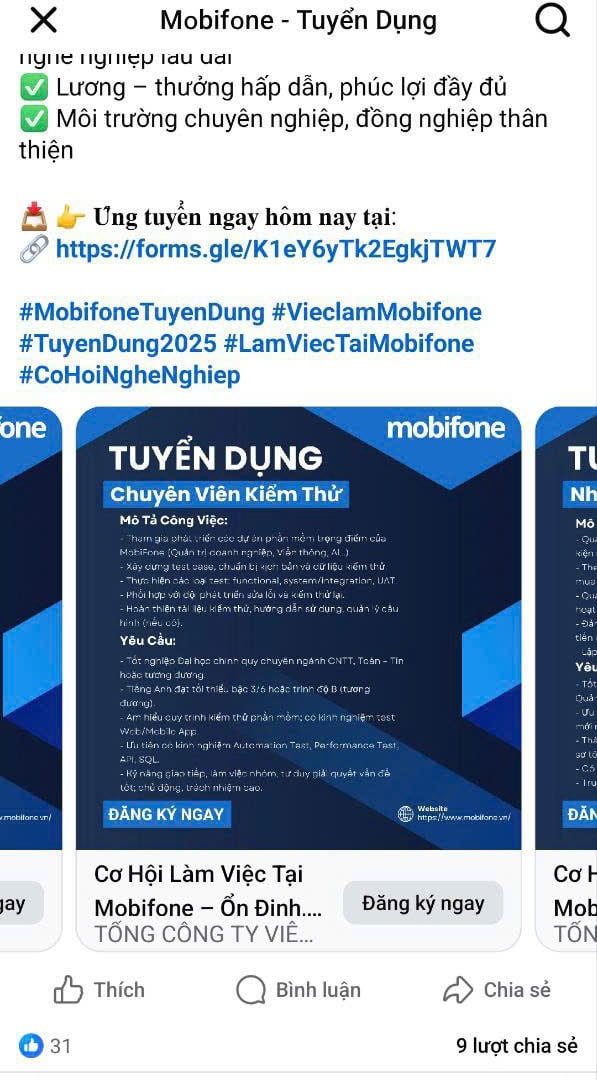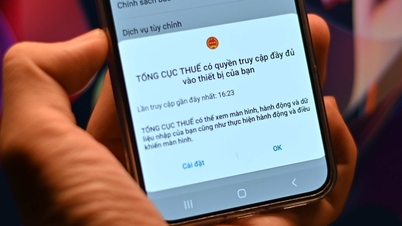 |
| Recruitment page Ms. H. registered. |
Ms. PTTH (born in 1992, an office worker, in Duc Xuan ward, Thai Nguyen province) recounted that while looking for a new job opportunity, she saw a fanpage with a blue tick, named after a large telecommunications corporation, posting recruitment information with attractive salaries. The information was very professional, complete from job position, salary, and work location.
After filling out the application form, about an hour later, she received a call to confirm her email address and invite her to an online interview. Everything was exactly like a normal recruitment process.
However, the irregularities quickly became apparent. After receiving an email announcing the recruitment period with instructions for installing the “Signal” app, Ms. H. followed the instructions and was placed in a group named “GROUP 13: MOBIFONE PRELIMINARY SELECTION”. Ms. H. and several other accounts were asked to take an online test with 15 multiple-choice questions revolving around the information she needed to know about the company she was looking to recruit.
In this chat group, members welcome and encourage each other, some nicks enthusiastically “have received the money”, continuously sending messages to persuade those who have just installed the app to complete the procedure. Messages like “have you installed it yet?”, “need any help?” appear regularly.
Suspicious, she stopped, did not complete the registration and observed. She downloaded the screenshots posted by a “registered” person in the group; from those images and small details in the interface of that website, she assumed that she was facing a scam scenario. When Ms. H. did not register, did not respond to messages, the chat group also suddenly became quiet, the accounts that had “showed off” about receiving money were no longer active. This is a common sign when a scam group cannot recruit the next victim or wants to change its field of operation.
Ms. H. added: At that time, I suspected that this was a scam. A large company could not recruit quickly, and even less require candidates to download strange applications or have private conversations like that. Looking closely at the recruitment notification email, I discovered that the email they sent had the suffix ".com" (a type of self-made personal email), instead of ".vn" like legitimate businesses and organizations.
The scam scenario usually follows these steps: Posting a "light job, high salary" recruitment ad on a fake fanpage, even with a blue tick; Asking the candidate to fill out an application form and then calling to confirm, talking very professionally; Inviting them to download a strange app or join a chat group to take a test, then leading them in another direction that has nothing to do with the job the recruiter originally applied for.
In the group, the subject's accomplices would "act" like other candidates, continuously showing off good results such as receiving hundreds of millions of dong in compensation to create trust with the purpose of getting the victims to provide personal information, deposit money or register accounts on fake apps.
The common points of these tricks are: recruiting too quickly, promising unusually high salaries, using unofficial emails/websites, and forcing the installation of strange applications.
To avoid falling into traps, job seekers should note: Carefully check emails and websites: Large enterprises often use the domain name ".vn". If in doubt, call the official hotline directly to verify. Be wary of "unusually high salaries". Serious recruitment always has a long process, there is no such thing as submitting an application and immediately getting a job with a salary of tens of millions. Absolutely do not download strange applications, do not provide OTP, passwords, account numbers to strangers. Keep evidence (messages, emails, links) and report to the police when detecting signs of fraud.
Source: https://baothainguyen.vn/xa-hoi/202510/canh-bao-chieu-lua-dao-tuyen-dung-b1974fa/



![[Photo] Prime Minister Pham Minh Chinh meets with Speaker of the Hungarian National Assembly Kover Laszlo](https://vphoto.vietnam.vn/thumb/1200x675/vietnam/resource/IMAGE/2025/10/20/1760970413415_dsc-8111-jpg.webp)
![[Photo] Da Nang residents "hunt for photos" of big waves at the mouth of the Han River](https://vphoto.vietnam.vn/thumb/1200x675/vietnam/resource/IMAGE/2025/10/21/1761043632309_ndo_br_11-jpg.webp)


![[Photo] Prime Minister Pham Minh Chinh received Mr. Yamamoto Ichita, Governor of Gunma Province (Japan)](https://vphoto.vietnam.vn/thumb/1200x675/vietnam/resource/IMAGE/2025/10/21/1761032833411_dsc-8867-jpg.webp)







































































































Comment (0)